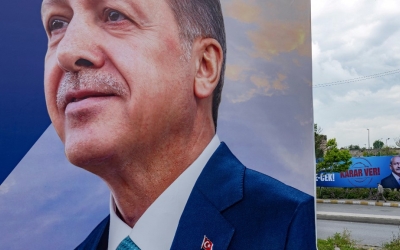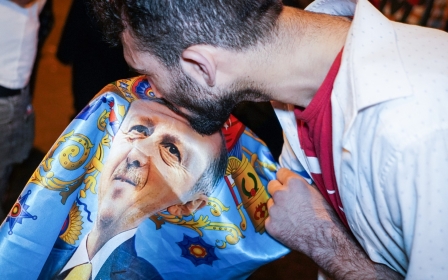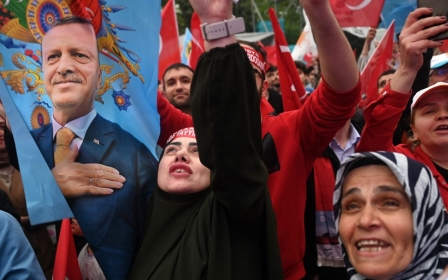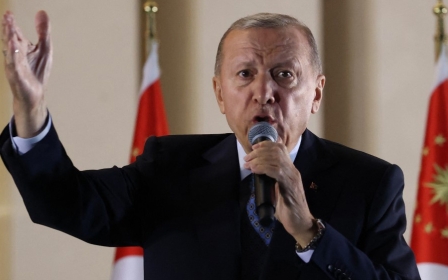Turkey elections: How the media machine failed voters
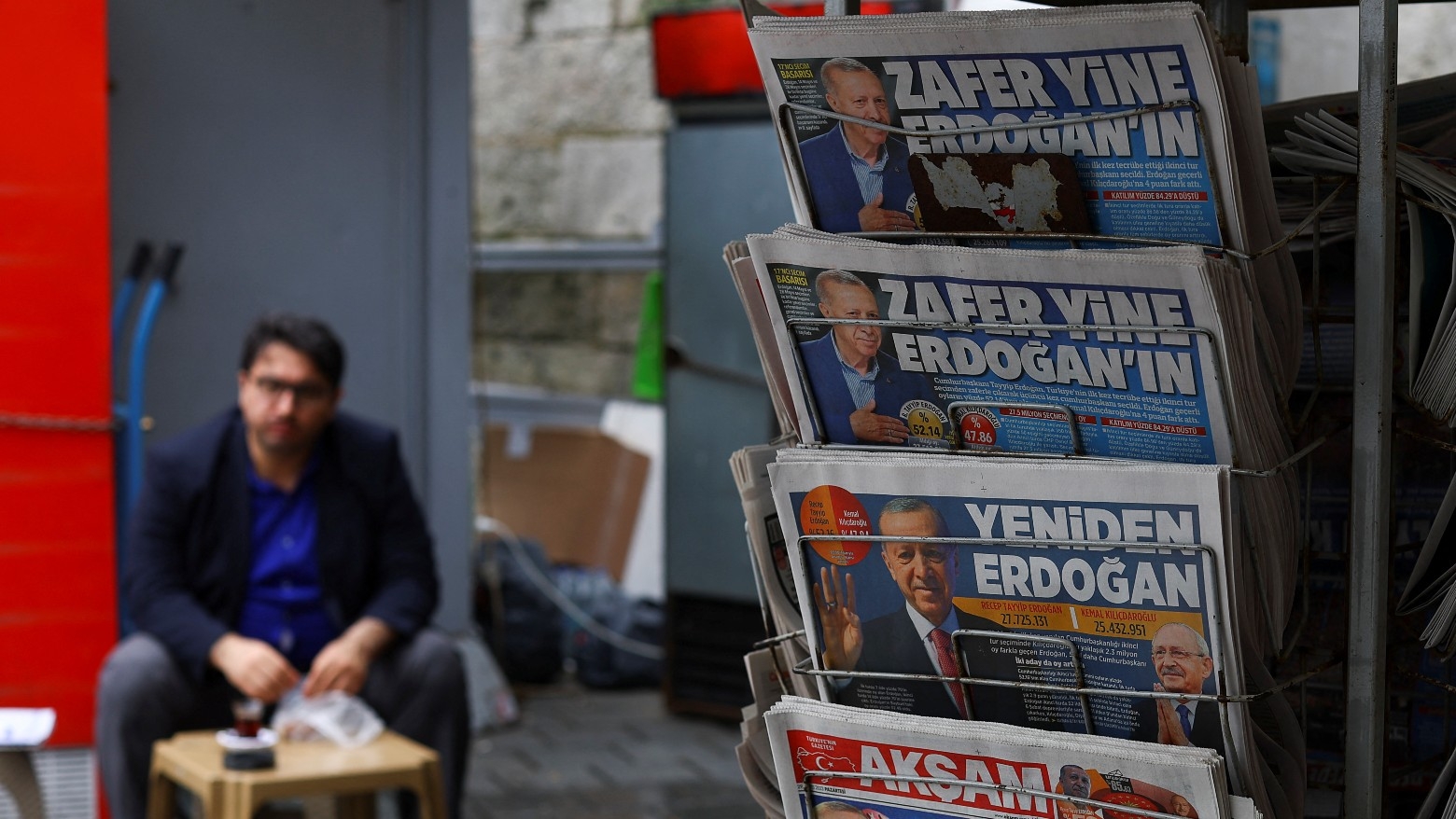
After months of intense drama that captivated audiences far beyond Turkey, the presidential election is finally over. President Recep Tayyip Erdogan emerged victorious, defying most opinion polls and analyses that had favoured his long-time rival, Kemal Kilicdaroglu, in the run-up to the race.
Much has been written about how Erdogan managed to secure a historic third term, despite soaring inflation and a botched response to the February earthquake. There has also been much focus on how Kilicdaroglu failed to seize what many considered the opposition’s biggest chance yet to oust Turkey’s longest-serving leader.
The performance of Turkish media during the heated campaign season has received less coverage - and when it has, the coverage has focused on Erdogan’s tight grip over the media. But the overwhelming media bias was well anticipated, and the opposition bloc had the time and opportunity to facilitate an environment where critical or independent outlets could offer an alternative. Apparently, it preferred not to do so.
Two days before the 28 May run-off election, Kilicdaroglu appeared furious in a video he posted on Twitter.
“I’m under total blackout,” he said, accusing telecommunications companies of preventing him from sending text messages even to journalists on the government’s orders. “Constant slander, lies, conspiracies … Should I not participate in the election? Is this what you want?”
New MEE newsletter: Jerusalem Dispatch
Sign up to get the latest insights and analysis on Israel-Palestine, alongside Turkey Unpacked and other MEE newsletters
In contrast, a day before the first round of voting, the incumbent president gave a live interview that was broadcast simultaneously on more than two dozen channels.
As the vote count drew to a close, showing Erdogan with a four-point lead, Kilicdaroglu complained about the absence of a level playing field: “We experienced the most unfair election in recent years. All the means of the state were mobilised for a political party. All possibilities were laid under one man’s feet.”
Biased coverage
He wasn’t alone in thinking this way. International observers also noted that neither the first round on 14 May, nor the run-off two weeks later, was fair, citing biased media coverage in favour of the government during the campaign period.
Take state-run TRT. Although funded by taxpayers and required to be impartial by the constitution, it gave Erdogan’s campaign more than 48 hours of live airtime, while Kilicdaroglu had a mere 32 minutes to get his messaging out between 1 April and 11 May.
For those who get their news from TRT, the third presidential candidate, Sinan Ogan, didn’t even exist prior to the first-round vote - so much so that he held a media briefing in protest outside TRT headquarters. Only after throwing his support behind Erdogan ahead of the run-off was he hailed as a kingmaker, and the locked doors of the channel were magically opened for him.
Over the years, the ruling AKP’s dominance over mainstream media has led to a dramatic collapse in its journalistic quality and competence. During the election season, this sad state of affairs was reflected in several tragicomic live broadcast incidents.
One occurred on A Haber, a private television news channel owned by the pro-government Turkuvaz Media Group. A crew at Istanbul Airport interviewed voters as they exited the voting booth, one of whom responded in Arabic: “I have never seen democratic elections like I have seen in Turkey.”
Although the correspondent quickly interrupted him, the moment went viral on social media, sparking criticism of the passport scheme that grants Turkish citizenship through real-estate purchases.
Days later, another major blunder took place when Erdogan was live on TRT with one of his favourite columnists, Abdulkadir Selvi, who asked the president to explain his recent remarks in campaign rallies about a video purportedly showing the outlawed Kurdistan Workers’ Party’s leaders singing in support of Kilicdaroglu.
“Kilicdaroglu has videos with those in Qandil … Be it montage, this or that, these videos were recorded,” Erdogan replied, thus acknowledging that the clip he repeatedly played to his supporters was doctored.
Time for reflection
Despite these blunders, the AKP’s immense influence over mainstream media did its job. The media supported Erdogan’s re-election wholeheartedly. But that was expected; every critical observer in Turkey knew this would happen. So what did the opposition do about it?
In the 2019 local elections, a united opposition managed to take over major cities, including Istanbul and Ankara, from the AKP. The hope for change was in the air more than ever before.
The following months saw several pro-government media outlets shut down as they lost a major source of their income - subsidies given out by AKP-held municipalities. Those funds were now in the hands of the opposition, and it had a unique opportunity to open a space within the Turkish media landscape for strong and independent journalism.
But it did not do that. The opposition parties and the vast majority of journalists who supported them were quick to forget about all the criticism they rightly voiced against partisan media practices funded by government subsidies. They inherited the AKP model of dealing with the media and wholeheartedly embraced it.
In the end, the opposition media did nothing to convince voters from the other camp to see the opposition as a better alternative
Instead of encouraging an environment where independent media could thrive, the opposition used its resources to create a media sector of its own, which would obediently follow its agenda. The country’s brightest journalists were reduced to talking heads, discussing party rumours and regurgitating pro-opposition narratives. In the end, the opposition media did nothing to convince voters from the other camp to see the opposition as a better alternative.
This is because it displayed the exact same biases and journalistic failures the AKP-favouring mainstream media did. It did not offer impartial or nuanced reporting on the affairs of the country or the election process, which could have drawn viewers and readers from different political backgrounds. Instead, it often engaged in harsh and unjust criticism of alternative voices within the opposition, looking down on government supporters and ignoring the other side of the story.
This left Turkish voters stuck between pro-government and opposition media machines appealing to their emotions, rather than giving them the hard facts and letting them decide for themselves. In the end, this further polarised the electorate and worked in favour of the AKP narrative and media strategy.
It’s true that Kilicdaroglu had to compete in a difficult political and media environment. But this alone cannot be blamed for his defeat. The opposition should now be analysing what it did wrong in the elections, as should opposition-minded journalists and media outlets.
For what’s left of journalism in Turkey to be taken seriously again, there must be self-criticism and hard reflection on the consequences of chasing easy ratings by further fuelling divisions.
The views expressed in this article belong to the author and do not necessarily reflect the editorial policy of Middle East Eye.
Middle East Eye delivers independent and unrivalled coverage and analysis of the Middle East, North Africa and beyond. To learn more about republishing this content and the associated fees, please fill out this form. More about MEE can be found here.



